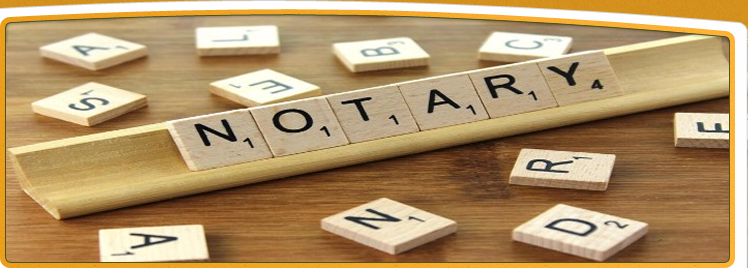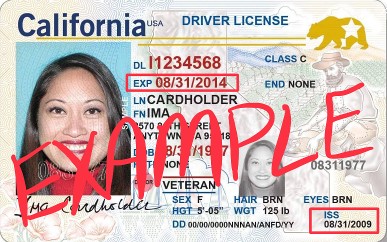| |
|

Common Questions Asked To A Notary Public: |
|
1. |
|
A Notary Public is an official appointed by the Secretary of State to serve the public as an impartial witness in performing acts related to the signing of important documents.
Notaries are publicly commissioned officials, meaning that they are expected to follow written rules without the exercise of significant personal discretion. It is the foremost duty of a Notary to screen the signers for their true identity, their willingness to sign without duress or intimidation, and their awareness of the general import of the document.
Some notarization's also require the Notary to put the signer under an oath declaring under penalty of perjury that the information contained in a document is true and correct. |
|
|
|
A mobile Notary is a Notary that travels to your Home or office at a time that is convenient to you and Notarizes your documents for an additional fee. |
|
|
Do notary commissions expire? |
California notary commissions last for four years and must be renewed before the expiration date. The expiration date was determined when your current commission was approved and your commission packet was mailed to you by the California Secretary of State, not when you filed your surety bond at the county clerk’s office where your oath of office was administered. |
|
|
Do notarized documents expire? |
No, notarized documents do not expire. Once a document has been notarized it is valid indefinitely. However, if the document contains information that may no longer be accurate (such as an address or other personal information) then it should be updated accordingly.
There has been instances where the state, federal or county department required a certain document to be updated annually with attached documents and a new notarized notary stamp. |
|
|
Can I use white out on a notarized document? |
It is important to make sure that no changes are made to a document after it has been notarized. Doing so can invalidate the notarization and lead to potential legal issues. Using white-out on a document after it has been notarized can have the same effect as making changes to the document. This is why it is important for all parties involved to double-check all documents before they are notarized. |
|
|
|
Two Credible Witnesses - you will need to provide 2 people that know you personally, but are not named in the document(s) or benefiting from the documents needing notarization. They must appear in person with you, present their valid ID's to the notary, take an oath from the notary and sign and thumbprint the Notary's Journal of Notarial Acts. |
|
|
If the signer is unable to sign their name, what can be done? |
A signature by mark is an alternative to writing a full signature. The signer instead makes a mark (such as an "X") or other symbols on the document. Under the laws of many states, a mark is considered a signature and is treated as such. There must be two witnesses present and they can not be named in the document(s) or benefiting from the documents needing notarization. |
|
|
Will you travel and visit a patient at a hospital or nursing facility? |
Yes, I will travel and visit a patient at a hospital or nursing facility for a notary assignment. The signer will need to be alert and aware. As the notary, I will assess the signer's mental comprehension before any documents are signed. Unfortunately, if the signer is suffering from Alzheimer's, advanced stages of dementia or are heavily medicated, or are under the influence of narcotics or alcohol such that they do not comprehend the reason for notarization, we will be unable to notarize the documents. |
|
|
What is a notary public, and what do they do? |
A notary public is a public officer appointed by the government to witness the signing of documents and to certify their authenticity. They are responsible for verifying the identity of those signing documents, ensuring that all parties involved understand what they are signing, and authenticating signatures on legal documents. |
|
|
What should I have on me to get the notary done? |
Appropriate and Non-expired IDs:
- Driver's license or identification card issued by the California DMV
- Driver's license or identification card issued by another state DMV
- U.S. Passport
- Foreign Passport
- Military ID card
- Consular card
- Tribal ID card
- CDCR Inmate ID card
- ID bracelet issued by Sheriff Detention Center
|
11. Can a Notary accept a expired ID?
In California, the signer(s) ID must be current and not expired.
For your information: A California ID is issued every 5 years.
An ID that was issued five years or more, prior to the date of the notarization assignment, that ID is expired. That expired ID may not be accepted. This requirement applies to all signer(s) ID presented for both acknowledgments and jurats.

Above is example of a expired ID.
The example ID was issued on 08/31/2009 and it expired on 08/31/2014. This ID is not acceptable if the notary was asked to notarize a document on 08/31/2014.

|
12. Are notaries allowed to accept a signer’s temporary ID from the DMV to notarize a document?
No. A temporary ID issued by the California DMV is not an acceptable form of identification for the purposes of notarization. This type of ID does not meet the requirements of CA Notary law to identify a signer. |
|
|
Is notarization required by law? |
For many documents, yes. Certain affidavits, real estate deeds and other documents, may not be legally binding unless they are property notarized. |
|
|
May a Notary give legal advise or draft legal documents? |
Absolutely not. A Notary is forbidden from preparing legal documents for others or acting as a legal advisor unless he/she is also an attorney. |
|
|
May a Notary refuse to serve people? |
Only if the Notary is uncertain of a signer's identity, willingness, or general competence, or has a good reason to suspect fraud. Notaries should not refuse to serve anyone because of race, religion, nationality, lifestyle, or because the person is not a client or customer. Discrimination on any basis is not a suitable policy for a public official. |
|
|
What are witnesses, and what do they do? |
A witness is a neutral third party who watches the parties sign their legal document. They’re brought in to confirm the identities of all the signers and that no forgery occurred. After that, they sign the document too.
Your witness must be at least 18 years old and of sound mind when witnessing a document’s execution. They also can’t be in a position to benefit from the contract or be related to one of the signers. If they are, they’re creating a conflict of interest.
Even if your document doesn’t require a witness, it doesn’t hurt to include one because they can confirm the validity of the signatures if they’re ever disputed. |
|
|
When do I need notaries and witnesses for my document? |
You’ll usually need to have your document notarized and witnessed if it’s related to matters concerning the court system, banks, or other financial institutions.
Some of the most common documents that get notarized include:
These documents require notarization because they’re used to deal with finances, property, estates, and sworn statements, and it’s essential that no fraud occurs. |
|
|
Is it necessary to get fingerprints of a person for whom I notarize? |
|
|
|
|
Can I notarize documents that have been prepared in another state, or that are being sent to a different state or country? |
Yes, if the signer is in front of you and their document needs to be notarized, you can notarize it. Notarizing signatures on documents can be complicated if the document is being prepared in another state or country, but a notary public can still help.
Notaries are specially commissioned public officials who are authorized to certify and authenticate signatures on documents.
|
|
|
Why are notaries and notarizations necessary for states. |
Notaries and notarizations are essential in ensuring the validity of documents and transactions. Notarization is a process that involves verifying the identity of the person signing a document, witnessing their signature, and then attesting to the authenticity of that signature. This process helps protect against fraud and forgery by providing an additional layer of security. Notaries are required to sign an oath of office form which promises an alliance to the state’s office.
Notary laws also provide impartiality to ensure that both parties involved in a transaction are aware of all terms and conditions associated with it. The notary’s signature serves as a guarantee that all parties involved have agreed to the document’s contents.
By requiring notarization, people, businesses, and governments can be sure that any documents they sign or accept are legally binding and protected from potential disputes down the line. |
|
|
What is Remote Online Notarization (RON) and is it available in California? |
With Remote Online Notarization, a signer personally appears before the Notary at the time of the notarization using audio-visual technology over the internet instead of being physically present in the same room. Remote online notarization is also called webcam notarization, online notarization or virtual notarization.
Currently, California does not permit Notaries to perform Remote Online Notarizations (RON). It is in the process of being implemented around 2030. |
|
|
What is In-person Electronic Notarization (IPEN) and is it available in California? |
IPEN (in-person electronic notarizations) means exactly what it says. They are in-person notarial acts. In other words, they require the signer to appear in front of the Notary in the same physical location at the time of the notarization, and be identified by the Notary in the same way as a traditional notarization. But the difference is that the documents are presented in a digital format and signed using an electronic signature. The Notary uses an electronic seal and signature to notarize the document.
|
|
|
|

